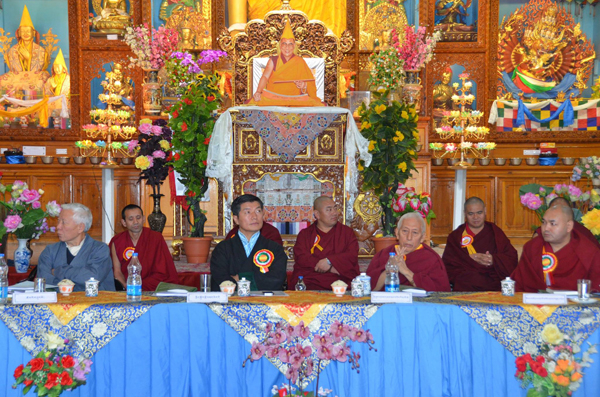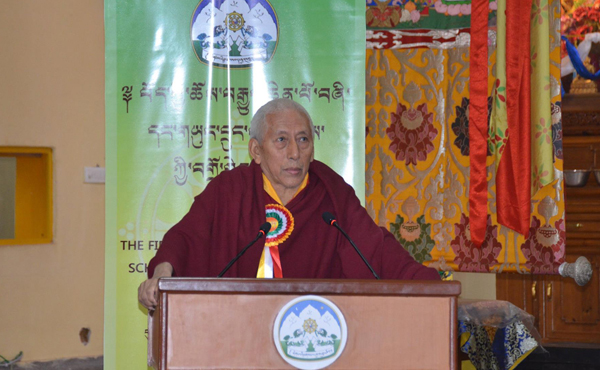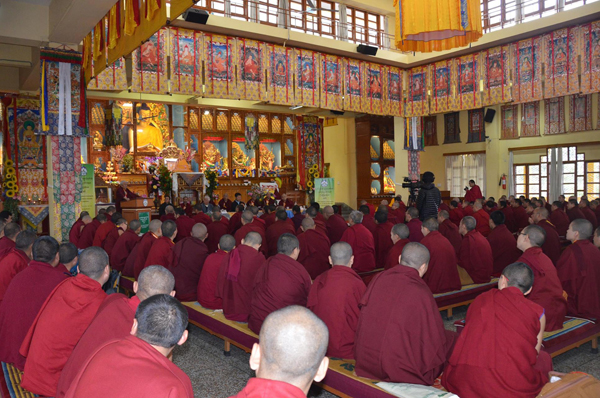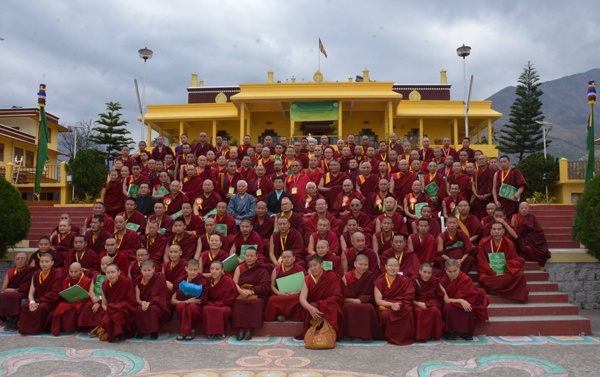Rinpoche Addresses at the First Seminar of Four Major Schools of Tibetan Buddhism and Bon Tradition
March 1, 2015 This morning Prof. Samdhong Rinpoche gave a guidance address at the opening of the three-day the First Seminar of Four Major Schools of Tibetan Buddhism and Bon Tradition, organised by The Department of Religion and Culture, CTA at Gyuto Monastery, Dharamsala.
 The advices His Eminence Prof. Samdhong Rinpoche gave include: (a) Such conferences these days, of various names and manners of conducting them, are new to Buddhists but once they become understood they are not so difficult; (b) If the splendid attributes which the Tibetans have are not identified, there is the situation of not recognizing them, and as such, there arises the mistaken doubt wondering if we have lagged behind; (c) There should be a slight difference in
The advices His Eminence Prof. Samdhong Rinpoche gave include: (a) Such conferences these days, of various names and manners of conducting them, are new to Buddhists but once they become understood they are not so difficult; (b) If the splendid attributes which the Tibetans have are not identified, there is the situation of not recognizing them, and as such, there arises the mistaken doubt wondering if we have lagged behind; (c) There should be a slight difference in  presenting in everyday language the teachings of Buddha; (d) Buddha did not teach all that Buddha knew, rather in accordance with the mental states of the trainees (the sentient beings) that the teachings were given; (e) To analyse with reasoning is the unique way of studying in Buddhism; (f) Merely to rely on scriptural citations would not enhance the wisdom risen through thinking and the wisdom risen through meditation; (g) The biggest shortcomings of the modern education is to go about by assuming things (by assumption); if one leaves it on assumption, when not knowing, it is a blind faith; (f) Through applying the vast teachings and the texts in Buddhism on Valid Cognition, one should do, suitable to one’s mental ability, scrutiny and clarifying of doubts.
presenting in everyday language the teachings of Buddha; (d) Buddha did not teach all that Buddha knew, rather in accordance with the mental states of the trainees (the sentient beings) that the teachings were given; (e) To analyse with reasoning is the unique way of studying in Buddhism; (f) Merely to rely on scriptural citations would not enhance the wisdom risen through thinking and the wisdom risen through meditation; (g) The biggest shortcomings of the modern education is to go about by assuming things (by assumption); if one leaves it on assumption, when not knowing, it is a blind faith; (f) Through applying the vast teachings and the texts in Buddhism on Valid Cognition, one should do, suitable to one’s mental ability, scrutiny and clarifying of doubts.
 In the context of the above preceding point Rinpoche pointed out that it is doubtful whether Tibetan Buddhism would have become so vast and so profound, as it is now, if the Great Abbot Shantarakshita had not come to Tibet. Because The Great Abbot himself was a great adept at Valid Cognition (Pramana), not only Shantarakshita advised Tibetans the need to do study with reliance on reasonings from Valid Cognition corpus of teachings, he instructed Tibetans the need to translate Buddha’s teachings and the classical Indian commentarial texts into Tibetans’ own language.
In the context of the above preceding point Rinpoche pointed out that it is doubtful whether Tibetan Buddhism would have become so vast and so profound, as it is now, if the Great Abbot Shantarakshita had not come to Tibet. Because The Great Abbot himself was a great adept at Valid Cognition (Pramana), not only Shantarakshita advised Tibetans the need to do study with reliance on reasonings from Valid Cognition corpus of teachings, he instructed Tibetans the need to translate Buddha’s teachings and the classical Indian commentarial texts into Tibetans’ own language.
 On the mode of conducting a discussion conference, Rinpoche gave the insights: Most of the teachings by Buddha were in the form of discussions; To not limit to an approximate understanding even by the Buddhists’ three-part presentation—refutation of other’s wrong views, presenting one’s correct view, and resolving thus the dialectical argument—but all should try to gain ascertained understanding [of the topics under discussions], which would then be the highest level of a discussion. Rinpoche then outlined the seven varying kinds of discussion conference in the Western system, and emphasized the need for an integrated applying, without separation, of explanation-dialectical debate-and-writing.
On the mode of conducting a discussion conference, Rinpoche gave the insights: Most of the teachings by Buddha were in the form of discussions; To not limit to an approximate understanding even by the Buddhists’ three-part presentation—refutation of other’s wrong views, presenting one’s correct view, and resolving thus the dialectical argument—but all should try to gain ascertained understanding [of the topics under discussions], which would then be the highest level of a discussion. Rinpoche then outlined the seven varying kinds of discussion conference in the Western system, and emphasized the need for an integrated applying, without separation, of explanation-dialectical debate-and-writing.